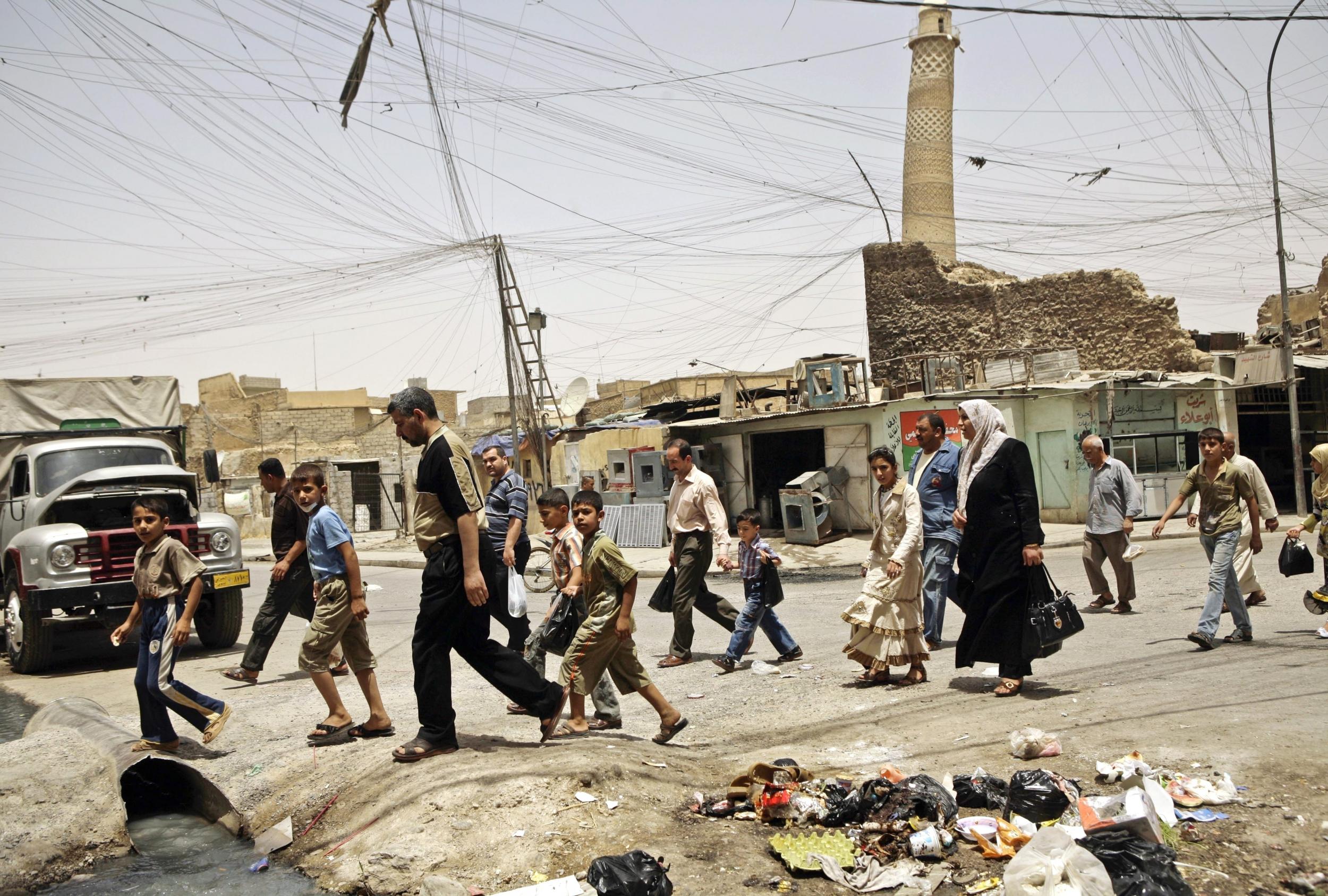Isis blows up Grand al-Nuri Mosque in Mosul where caliphate was declared, Iraqi army says
Iraqi military leaders had expressed privately that they would like to secure the mosque by the end of Ramadan

Isis fighters have blown up the historic Grand al-Nuri Mosque in Mosul, the Iraqi military has said, with the venerated site destroyed as government forces battled jihadi fighters nearby.
Iraqi Counter Terrorism Service had advanced to within 50 metres of the mosque during a push to take over the spot where the so-called caliphate was declared by Isis's leader Abu Bakr al-Baghdadi in summer 2014 following the jihadi group's capture of large swathes of Iraqi territory.
Isis "terror gangs committed another historical crime by blowing up the al-Nuri mosque and its historical al-Habda minaret", the Iraqi military said in a statement.
The mosque was named after a noble who fought the early crusades and was built in 1172-73, The minarets tilt gave the landmark its popular name - al-Hadba, or the hunchback.
A statement posted on the Amaq news service run by Isis clamed that US planes were responsible for the destruction of the mosque. Images that showing the mosque area and aerial photographs provided by the US military depicted scenes of widespread damage, with its renowned leaning minaret no longer standing and the compound largely in ruins.
A spokesman for the US led coalition denies striking the area of Mosul where the mosque was standing, saying it was not carrying out air strikes in the area.
The US-led coalition has been providing air and ground support for the Mosul offensive since October, when efforts began in earnest to retake the city.
“As our Iraqi security force [ISF] partners closed in on the al-Nouri mosque, Isis destroyed one of Mosul and Iraq’s great treasures,” said Major General Joseph Martin, commanding general of the US-led coalition fighting Isis.
“This is a crime against the people of Mosul and all of Iraq, and is an example of why this brutal organisation must be annihilated,” said Major General Martin.
“The responsibility of this devastation is laid firmly at the doorstep of Isis, and we continue to support our Iraqi partners as they bring these terrorists to justice. However, the battle for the liberation of Mosul is not yet complete, and we remain focused on supporting the ISF with that objective in mind,” he added.
Isis has destroyed countless monuments and historical treasures in the territory it has held across Iraq and Syria.
The black flag of the terror group had flown from atop the famous minaret in Mosul since 2014 and the Iraqi Prime Minister, Haider al-Abadi has claimed that the group have "conceded defeat" in destroying the mosque. However, given the significance of the area to Isis, the jihadis were always likely to either blow up or set traps within the mosque so that Iraqi forces could not declare victory in the same place their caliphate was founded.
Iraqi officials had privately said that they would have liked to capture the mosque in time for Eid al-Fitr, a festival that takes place at the end of Ramadan, the month in which Muslims fast. That festival begins this year in Iraq on June 25 or 26.
In Mosul, Isis has fought using a mix of urban guerrilla tactics that has withstood Iraqi government forces for months, holding the periphery of the city lightly and concentrating its fighters in the centre.
The Iraqi government announced the "liberation" of eastern Mosul in January, but the west of the city - with its winding, narrow streets - has proven more difficult. Isis tries to avoid its positions being identified from the air and destroyed, by using a mixture of mobile sniper teams, swiftly changing their positions by means of holes cut in the walls of houses, along with suicide bombers in vehicles, mines, booby traps and mortars. This has succeeded in slowing down and inflicting heavy casualties on the advancing Iraqi security forces.
Some streets in the Old City, the last district Isis holds, are obstructed with cloth to disrupt air surveillance, which has made the situation even more dangerous for civilians.
Even so, the Iraqi army estimates that there are just 300 Isis fighters left in the city, down from the estimated 6,000 who were there when the fighting began.
The situation in the Old City is reportedly very grim for civilians. There are more than 100,000 residents trapped in the fragile homes of the area with little or no food, water, medicine, and electricity, according to the UN. Their access to medical clinics is also very limited.
The International Committee of the Red cross says that sick and wounded civilians who escape through Isis lines have been dying in "high numbers". Coalition forces say they have established ways to ensure that people in areas of the city that are taken fro Isis can get help.
"We are trying to keep families inside their houses and, after we secure their block, we will evacuate them through safe routes", Lieutenant General Abdul Ghani al-Assadi, the senior commander for the Counter Terrorism Service in Mosul, told Iraqi state television.
Should coalition forces retake the city, it would effectively be the end of the Iraq portion of the caliphate, even though Isis fighters would still control territories to the west and south of Mosul as well as areas of Syria, including the Isis de facto capital in Raqqa.
Baghdadi is unlikely to be found in Mosul, as he has reportedly left the fighting there to local commanders. The Isis leader is suspected to be hiding in the border area between Iraq and Syria, US and Iraqi military sources say.
Join our commenting forum
Join thought-provoking conversations, follow other Independent readers and see their replies
0Comments